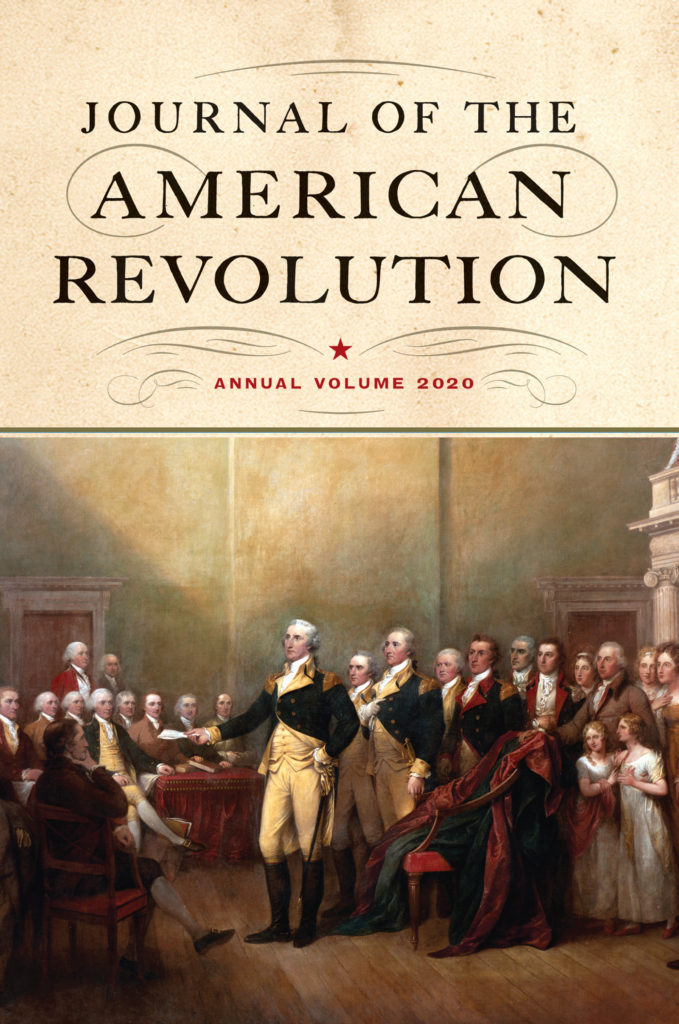

Journal of the American Revolution 2020
Annual Volume
Select Your Format:
Hardback$35.00eBook
$35.00 Add to Cart Save 25% on every book by joining our Book Club


Select Your Format:
HardbackThe year’s best articles from the leading on-line source of new research on the Revolution and Founding eras
The Journal of the American Revolution, Annual Volume 2020, presents the journal’s best historical research and writing over the past calendar year. The volume is designed for institutions, scholars, and enthusiasts to provide a convenient overview of the latest research and scholarship in American Revolution and Founding Era studies. The thirty-seven articles in the 2020 edition are:
The East India Company and Parliament’s “Fateful Decision” of 1767 by Steven Neill
The Molasses Act: A Brief History by Ken Shumate
How the Magna Carta Influenced the American Revolution by Jason Yonce
Thomas Paine Goes to Sea: A Pre-Revolutionary Tale by Jett B. Conner
“Monsr Dubuq,” the First French Officer to Serve the American Cause? by Frederic C. Detwiller
Les Habitants: Collaboration and Pro-American Violence in Canada, 1774–1776 by Sebastian Van Bastelaer
“That Damned Absurd Word Liberty”: Les Habitants, the
Quebec Act, and American Revolutionary Ideology, 1774–1776 by Sebastian Van Bastelaer
Massachusetts Privateers During the Siege of Boston by Alexander Cain
“Under God”: Understanding Its Revolutionary Usage by Brian Patrick O’Malley
The Declaration of Independence: Did John Hancock Really Say That about His Signature?—and Other Signing Stories by J. L. Bell
1776—The Horror Show by Brian Patrick O’Malley
Christmas Night, 1776: How Did They Cross? by William M. Welsch
Captain Lambert Wickes and “Gunboat Diplomacy, American Revolution Style” by Richard J. Werther
The Liberty: First American Warship, Among Many Firsts by Michael R. Gadue
James Willing and the Mississippi Expedition by Jeff Dacus
The “Hynson Business”—The Story of a Double Agent by Richard J. Werther
Death Had Almost Lost Its Sting: Disease on the Prison Ship Jerseyby Katie Turner Getty
Continental Congress vs. Continental Army: Paying for It All by Stuart Hatfield
Patrick Ferguson and His Rifle by Matthew Moss
A Chink in Britain’s Armor: John Paul Jones’s 1778 Raid on Whitehaven by Andrew A. Zellers-Frederick
The Treaty of Fort Pitt, 1778: The First U.S.–American Indian Treaty by Eric Sterner
The Last Vestiges of the Clove Road by Gabriel Neville
Misadventures in the Countryside: Escape from a British Prison Ship by Katie Turner Getty
George Farragut: The Epitome of an American Colonial by Jaume Sastre Moll
Donald McCraw of the 42nd Regiment Wields His Broadsword by Don N. Hagist
Augustine Barrett, Escaped British Prisoner of War, Pleads His Case by Don N. Hagist
Bernard E. Griffiths: Trumpeter Barney of the Queen’s Rangers, Chelsea Pensioner—and Freed Slave by Todd W. Braisted
Revisiting Bernard E. Griffiths: Former Slave, Queen’s Ranger, and “Son of Africa” by Stephen Brumwell
Major James Wemyss: Second Most Hated British Officer in the South by Randy A. Purvis
Benedict Arnold and James Wemyss: Similar Experiences, Contrasting Legacies by Gene Procknow
Retracing Alexander Hamilton’s Steps through the Remnants of Revolutionary New York by Gina Dimuro
Putting a Price on Loyalty: Mary Loring’s List of Losses by John Knight
The Revolutionary Memories of New York Loyalists, Thomas Jones and William Smith, Jr. by Cho-chien Feng
The Day Notre-Dame Cathedral Hosted Thomas Jefferson, John Adams, and King Louis XVI by John L. Smith, Jr.
The Constitution Counted Free Women and Children—And It Mattered by Andrew M. Schocket, Kinzey M. McLaren-Czerr, and Colin J. Spicer
America’s Revolution Against Toleration: The Rise of True Religious Liberty by Brian Patrick O’Malley
The Decision that Lost Britain the War: An Enigma Now Resolved by Ian Saberton

Don N. Hagist is managing editor of the Journal of the American Revolution. An expert on the British army in the American Revolution, he is the author of many books and articles, including British Soldiers, American War: Voices of the American Revolution and The Revolution’s Last Men: The Stories Behind the Photographs.
“The Journal of the American Revolution is an exciting experiment that benefits from the combined efforts of independent scholars and professional historians dedicated to re-examining the history of this country’s founding.” —Gregory J. W. Urwin, prize-winning historian, Temple University